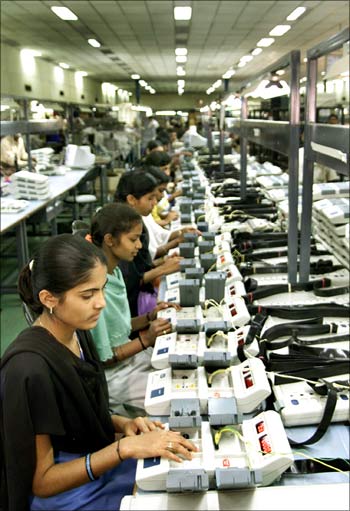
A World Economic Forum report on Tuesday said that India will face huge skills gaps in some job categories due to low employability over the next 20 years and also warned of a looming global labour crisis.
The report said that increasing mobility among countries will be a key part of the solution.
Despite high unemployment, the global economy has entered a decade of unparalleled talent scarcity, the report added. If left unaddressed, it will put a brake on economic growth in both developed and developing countries, the report said.
The WEF report -- 'Stimulating Economies through Fostering Talent Mobility' made in collaboration with The Boston Consulting Group -- demonstrates the magnitude of an impending global labour crisis by analysing talent shortages across 22 countries and 12 industry sectors and argues that talent mobility can stimulate economies in both developed and developing countries.
. . .

The WEF report said that the workforces of India and Brazil will grow by more than 200 million people over the next two decades
By 2030, the developed world will need millions of new employees to sustain economic growth, the report said. Of these, the United States will need 26 million employees, and western Europe will need 46 million employees.
"Today's high unemployment rates mask longer-term talent shortages that may affect both developing and developed countries for decades," said Piers Cumberlege, senior director, partnership, at the World Economic Forum.
The global population of 60 years and older will exceed that of 15-years-old or younger for the first time in history by 2050. But, the talent crisis will start much sooner. Barring technological breakthroughs, the United States, for example, will need to add 26 million workers to its talent pool by 2030 to sustain the average economic growth of the two past decades, the report reiterated.
In most developing countries -- not affected by demographic shifts -- strong economic growth and the limited employability of the workforce will lead to large skills gaps in some job categories.
. . .

Nations and industries will be particularly challenged by the shortages of highly skilled talent. "In today's global and fast-changing business environment, access to highly skilled people -- not just top talent, but also people who possess essential expertise -- is crucial to succeed and grow," noted Hans-Paul Burkner, global chief executive officer and president of The Boston Consulting Group, Germany.
Some industries, such as business services, IT and construction, are likely to experience significant skills gaps, regardless of geography. At the same time, certain countries, such as Japan, Russia and Germany, will face shortages of highly skilled employees in many industries.
Increasing the mobility among countries will be a key part of the solution, the report argued. "The message here is that migration not only works -- it is the only solution," said Angel Gurr a, secretary-general of the Organisation for Economic Co-operation and Development, Paris.
Contrary to conventional wisdom, greater mobility can benefit not only nations that receive talent, but also sending countries, especially large ones such as India.
In addition to fuelling their countries of origin with remittance funds, many expatriates eventually decide to return home armed with skills and business acumen developed abroad. Receiving countries benefit from the contribution of highly skilled migrant workers to their economies.
. . .

The report calls on governments, companies, educational institutions and international organizations to collaborate systematically to address talent shortages and increase talent mobility.
Countries need to prepare for demographic shifts and a fast-changing labour market environment by defining adequate education and migration policies.
The report recommends several ways:
. . .

Companies, meanwhile, need to improve their talent management strategies as many businesses within five to ten years will face sizable talent shortages. These improvements include: